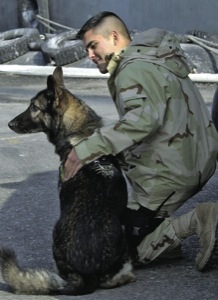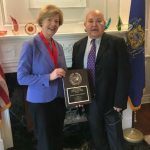
Gay sailor says anonymous sources do not reflect navy’s official decision
The Associated Press has reported, “the Navy says it wrongly accused Navy dog handler Michael Toussaint of singling out a gay sailor for hazing at kennels he ran in Bahrain.” However, that gay sailor, San Diegan Joseph Rocha, says the AP has their facts totally wrong.
Former Petty Officer Third Class Rocha, who was discharged in 2007 under the Don’t Ask, Don’t Tell policy, says Toussaint singled him out for being gay, causing him mental trauma and his exit from the Navy. The AP released a story last Thursday, citing two anonymous sources, saying, “Two Naval officers now say that Navy officials have found the investigation into Rocha’s charges was flawed, and the claims unsubstantiated.”
In an interview exclusive to the San Diego LGBT Weekly, Rocha says the AP version is not the Navy’s official view, and even though he has high-ranking Naval officials backing him, the AP will not retract nor correct their story.
“The official story is the United States Navy has come to a conclusion as to how to proceed with the discharge of Senior Chief Toussaint, and what type of discharge he would receive, what rank and what pay he would be entitled to after that discharge,” Rocha said. “First thing yesterday (Thursday) morning, the Under Secretary (Juan Garcia, Assistant Navy Secretary for Manpower and Reserve Affairs) contacted me to let me know the decision.”
Garcia’s decision, obtained by the San Diego LGBT Weekly through Rocha, reads:
“I approved the recommendation of the Retirement Grade Determination Board that MACS Toussaint transfer to the Fleet Reserve in paygrade E-8 with an honorable discharge. In making my determination, I thoroughly reviewed the matter, and weighed heavily material provided in the statements recorded during the initial command investigation and the record of proceedings from the Retirement Grade Determination Board.
“Ultimately, MACS Toussaint’s conduct as the Leading Chief Petty Officer assigned to the Military Working Dog Division, Naval Security Forces, Bahrain, did not meet the standards expected of senior enlisted leadership in our Navy. The Secretary of the Navy concurred with the CNO’s decision that Toussaint not be permitted to re-enlist in the United States Navy. However, when looking at his career in its entirety, I have determined that his conduct did not rise to a level sufficient to warrant retirement in a paygrade less than E-8.”
“The official decision is quite simply that the judgments and actions of Senior Chief Toussaint, while in charge of the canine unit in Bahrain, were not what was expected of senior leadership, and did not fit in with the Navy’s core values,” Rocha summarized, adding, “Which is not anything different than what we were expecting.”
The AP reported an entirely different story.
“They (the AP) went on to write 136 words based on two anonymous sources that were not official and made it read like it was coming from the institution of the Navy,” Rocha said. The two sources were never named, and the story read, “The officers spoke on condition of anonymity to discuss a private personnel matter.”
The AP contacted Rocha after the first story was released, seeking to get his reaction for a second expanded story.

“They didn’t bother to tell me that the original story and the following story were going to accuse me of being a fraud,” Rocha said. “So I offered a reasonable and respectful quote that reflected the conversation that I had with the Under Secretary. That quote was then used in the longer piece that was used to attack me.”
The second version of the story spread across the country the next day, with major publications reprinting the report, including versions in The Washington Post newspaper and The Advocate magazine.
After reading the AP stories, Rocha immediately called Garcia to confirm the position of the Navy, “which would have been an underhanded insult, considering the conversation we had earlier,” Rocha said. “He insisted that the AP stories were not the position of the Navy.”
Also during the second conversation, Rocha said Garcia already had attempted to contact the AP to correct the story with the accurate report. Garcia also said he was “unclear” to who the anonymous sources were, according to Rocha.
“Essentially he was telling me over the phone that everything the Navy has produced supports what I am saying,” Rocha continued. “No where will it say they made any wrongful accusations, and no where will it say they are retracting or going back on what they said a year ago when they first pulled Chief Toussaint out of active duty. And his memos and official writings were consistent with the finding of Toussaint’s leadership and actions that did not fall in line with core values of the United States Navy.”
Repeated emails from Rocha to the AP writer have gone unanswered. Inquiries to the AP from Garcia’s staff have also been answered, according to Rocha.
The Associated Press is a major news outlet for all forms of media across the world. On any given day, more than half the world’s population sees news from the AP, according to its website. It is considered one of the most reliable and unbiased sources of news in the media industry. Rocha says they got it wrong this time.
“Of course, every news outlet has been picking up the story,” Rocha said. “I think it is quite unfortunate that a lot of the media outlets that I have worked very closely with have chosen to publish that AP piece without getting in contact with me, or giving me the benefit of the doubt, or trying to communicate with me. The Advocate published it with a photo, with no attempt to reach me to see whether or not it was true. The Washington Post did the same. The list goes on.”
After the San Diego LGBT Weekly published Rocha’s version of the story online, at lgtbweekly.com, several other publications have opted not to run the AP story. The Advocate has changed its online story as well.
In 2009, Rocha wrote a guest commentary for The Washington Post, subsequently making him one of the best known of the more than 10,000 people dismissed from the military under Don’t Ask, Don’t Tell, the 1993 policy banning openly gay service members.
“I was tormented by my chief and fellow sailors, physically and emotionally, for being gay. The irony of Don’t Ask, Don’t Tell is that it protects bigots and punishes gays who comply,” Rocha wrote in the Times.
Rocha was invited to the White House this past December to watch President Obama sign the bill repealing the DADT policy. Obama encouraged those who were discharged to reenlist, and Rocha said he hopes to do just that.















